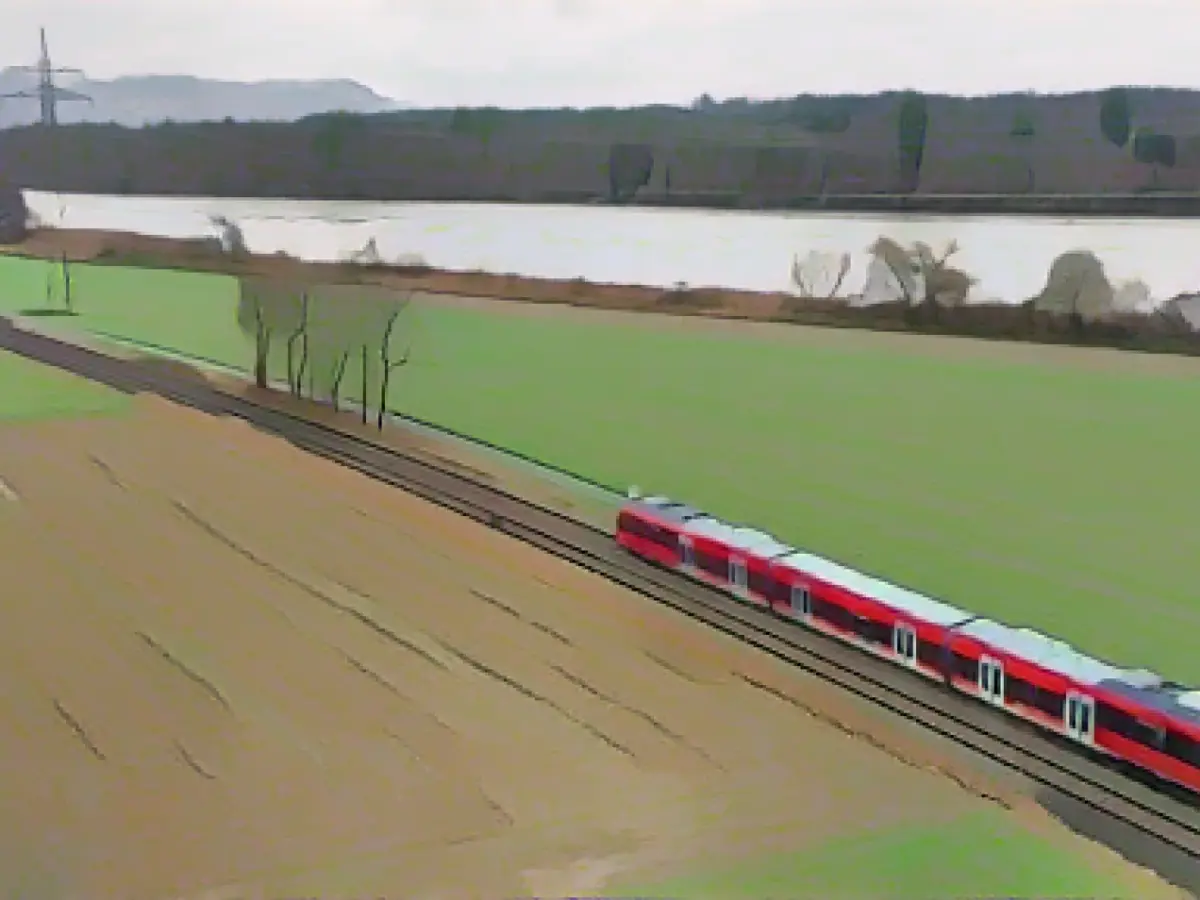Small-Scale Revolution: Hochrheinbahn Upgrades to Electrify Train Journeys
Get ready to wave goodbye to environmentally unfriendly diesel trains, as the Hochrheinbahn line between Basel and Erzingen in Baden is set to get an electrified makeover by 2027, according to Deutsche Bahn (DB) who announced the news in Laufenburg, Waldshut district. Thisay, this massive overhaul of the roughly 75-kilometer-long route will come with a hefty price tag of 434 million euros.
As part of the revamp, work will also be underway to make the stations more desirable for passengers. More connections between southern Baden, Lake Constance, and northern and eastern Switzerland are in the works, according to DB Netz board member responsible for infrastructure, Ingrid Felipe. She and project partners from Germany and Switzerland's neighboring nations put their signatures on the expansion contract, marking a historic day in rail travel.
State Transport Minister Winfried Hermann (Greens) expressed excitement for the project, calling it extraordinary, and revealed some stumbling blocks encountered along the way. He acknowledged feeling embarrassed about the inadequacy of the railroad in the 21st century, compared to conditions in the 19th century. Construction will kick off in 2025, but passengers will need to be prepared for some disruptions during the renovation period, Felipe warned.
Switzerland will chip in around 50 million euros towards the project funding, as announced by Hermann. Two kilometers of the electrified route will run on Swiss territory. Deutsche Bahn forecasts section closures and rail replacement services during construction, encouraging users to stay patient and flexible.
Swiss Federal Office of Transport director Peter Füglistaler shared his enthusiasm for an efficient and reliable Hochrheinbahn service, which will provide direct and speedy connections between Basel, Schaffhausen, Lake Constance, and eastern Switzerland. Füglistaler believed this will bring the regions on both sides of the Rhine closer together.
The federal government will be bearing the majority of the project costs at around three quarters. Hermann explained that DB is focusing its attention and investments primarily on "high-performance corridors", leaving other parts of the network to falter. Around 71% of rail lines in the southwest have already been electrified, with opportunities for more routes to minimize diesel train usage.
Backstory
The Hochrheinbahn expansion between Basel and Erzingen in Baden is a crucial step towards improving the overall rail connectivity in the region. This project is a multilayer effort by Swiss Federal Railways (SBB) and their partners to upgrade the existing infrastructure, add new tracks, and improve signaling systems.
Investments in modern signaling systems, improved station facilities, and environmental-friendly trains will result in reduced travel times between key destinations like Basel, Erzingen, and eastern Switzerland. This expansion will also boost the overall passenger experience and service quality.
The exact timeline for the construction phase is yet to be confirmed, but it is estimated to take several years, given the substantial financial input required for the project. Regional authorities and the federal government will both contribute financial resources, with the federal government bearing the lion's share of the costs.
The Power of Electrification
The electrification of the Hochrheinbahn line comes with numerous benefits, including reduced fuel dependence, lower greenhouse gas emissions, and improved overall sustainability in rail travel. Additionally, electrified trains offer increased efficiency and cost-effectiveness, as electrical energy is less expensive than diesel fuel.
Synchronized electronic signaling systems and more frequent trains will result in better space utilization and less congestion on the rail network, contributing to a smoother riding experience for passengers. Electrification will also open up opportunities for introducing new and diverse train types that match various travel requirements.
Engaging in sustainable transportation practices is essential for addressing climate change, and rail transport plays a vital role in reducing carbon emissions. Electric trains, in particular, are environmentally friendly alternatives to diesel trains, aiming to preserve the earth for future generations.
As the Hochrheinbahn line gets electrified, rail travel in the region will become more efficient, eco-friendly, and accessible, ultimately fostering sustainable development and growth within the communities in southern Baden, Lake Constance, and eastern Switzerland. This important project is a major leap forward in realizing the full potential of rail travel for the benefit of both passengers and the environment.








